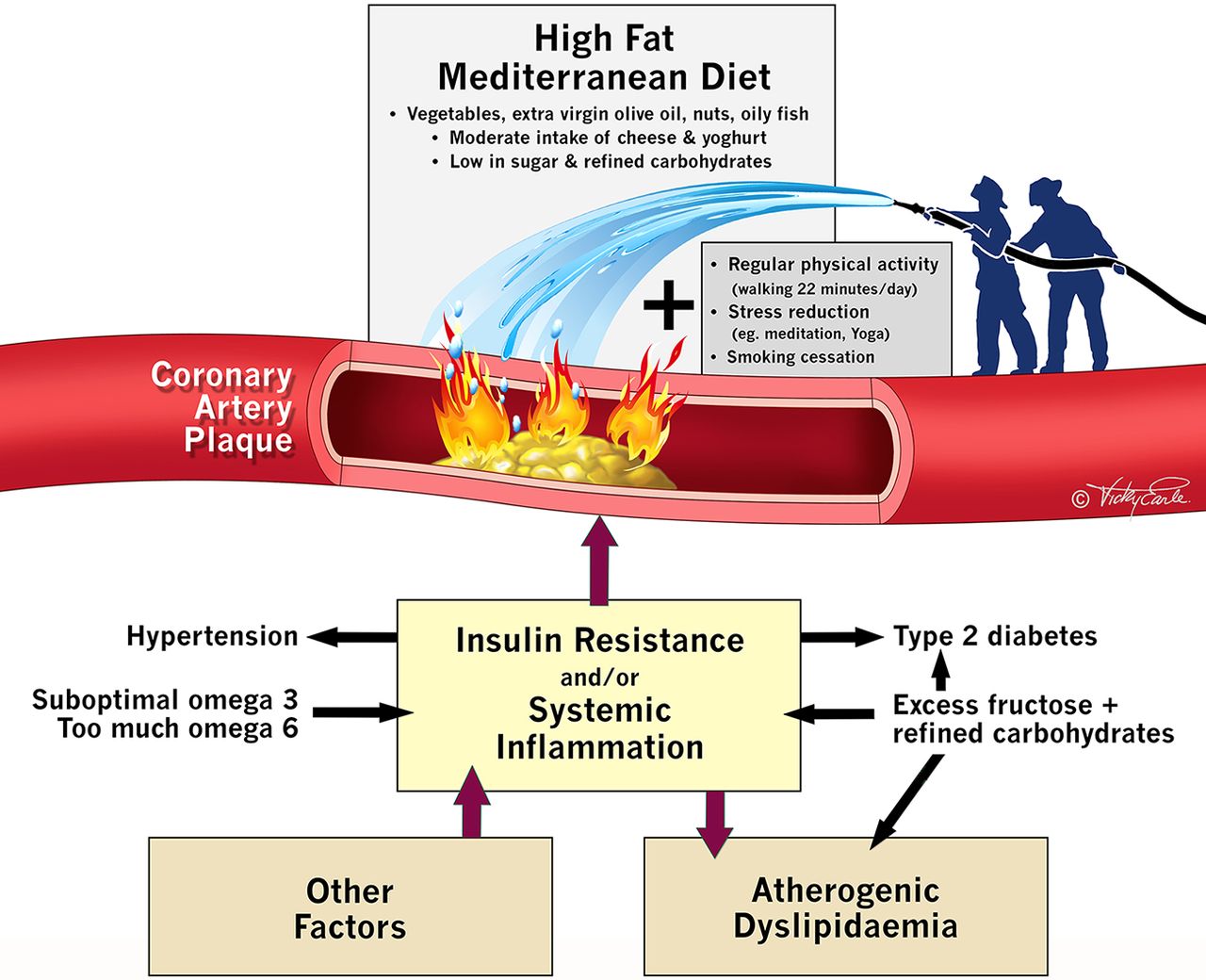
17 Apr Heart health how-to
Your doctor just told you that you have cardiovascular disease. OMG. How did this happen? What do you do now?
But first let me guess some things about you. Your waistline keeps getting bigger, even though you try to eat low fat and low salt. Your doctor is also worried about your blood sugar. Your HDL cholesterol is too low. And your blood pressure is high.
How did I know all this? I bet I’m right on, because you probably have cardiometabolic syndrome. It’s basically a cluster of symptoms that means you are at risk for a heart attack, stroke, and diabetes. You might even be at risk for Alzheimer’s.
You are probably thinking that all this was inevitable because heart disease runs in your family. Cholesterol that’s too high or low is genetic. Curse those genes. One more reason to resent your parents. But let me say this about genetics.
Your genes load the gun, and environment pulls the trigger.
That means that your genetics is not your destiny. Very few genes determine absolutely a certain health condition. For most everything else, you inherit a tendency and your lifestyle will determine how that plays out.
When you were a little kid, did you have heart disease? No, of course not, for the vast majority. So something happened in all those years that led to the situation you’re in now. That something is lifestyle choices.
Lifestyle leads to cardiometabolic syndrome
It usually starts with food. Maybe you followed the food pyramid and avoided saturated fat. The problem with that plan is that it doesn’t take into account the pesticides and chemicals found in otherwise healthy food. The abundance of wheat in the diet makes sure you get megadoses of pesticides and chemicals. And that starts to wear on your digestive system.
When your digestion is impaired, you develop leaky gut. The lining of your digestive tract is delicate, so that food molecules can pass through. But if it’s damaged by bad things in your food, then large particles leak through and your body reacts to the large particles with inflammation.
Have your ever twisted your ankle, and it got red, puffy, and warm? That’s inflammation. The same process goes on inside your body, only it’s not visible like in your ankle. It’s a healing reaction. Your body’s doing its best to fix things. Only the problem is you keep eating junk and your body can’t keep up. Or you have some other toxic exposure that is making things difficult.
This leads to chronic inflammation which leads to all the problems you’re having. The first thing you notice is belly fat. You keep loosening your belt or you buy industrial strength spanks. The next thing you find is that your blood sugar is high. This is part of your body’s reaction to inflammation. So is high blood pressure. And your unsatisfactory cholesterol numbers. If things don’t change, you will build up plaque in your arteries. And when the plaque ruptures, like a pimple popping, you can get a blood clot that causes a heart attack or stroke. Yes that’s scary.
You might be prescribed a statin. Of course you take what your doctor prescribes, but statins raise your risk for diabetes. Did you gain even more belly fat after starting statins? That’s a sign that you are headed in the direction of diabetes. You could try to diet, but that doesn’t really work. That’s because that’s not the answer to quelling inflammation and resolving cardiometabolic syndrome.
The answers
First, realize that saturated fat does not clog the arteries. That concept was based on weak science and newer studies are pretty conclusive on that. Industrial seed oils, like canola oil, and corn oil, are bad for your heart health so should be avoided. Instead choose healthy fatty foods like avocado, salmon, nuts, and healthy fats like olive oil.
Eat all the vegetables you can. I think I say that in every blog post. Because it’s true and very healing. Buy organic when you can. Eat probiotic food like yogurt to balance your digestive tract. Avoid processed foods as they usually contain sweeteners, chemicals, and refined flours. None of those support health. Sugar and flour spike your insulin and lead to insulin resistance and diabetes. Minimize alcohol. Minimize dairy. Eat fruit if you want sweets. They have a lot of nutrition.
Also get plenty restorative sleep so that your body can fight the inflammation and heal your arteries. Move, move, move. Which means, move throughout the day instead of sitting. Even better is to exercise. Manage stress with breathing, meditating, journaling, or what works for you.
These may be drastic changes for your lifestyle, and you may find yourself with cravings or feelings of withdrawal from sugar and wheat. I can help you. I’m a National Board Certified Health and Wellness Coach. I studied functional medicine which means I help you get to the root causes of your problems. I listen to you and help you achieve your goals, step by step. I don’t sell products or put you on a plan. I offer personalized health coaching. Contact me and see if we can work together.
Comments: Are you concerned about heart health? Tell us.
Dr. Shilpa Saxena: Low fat is unhealthy
Greenmedinfo: Unclog your arteries naturally
British Journal of Sports Medicine (see graphic below): Saturated fat does not clog arteries
Chris Kresser: American approach to heart disease has failed

This article is for information purposes only. See Disclaimer below.



No Comments